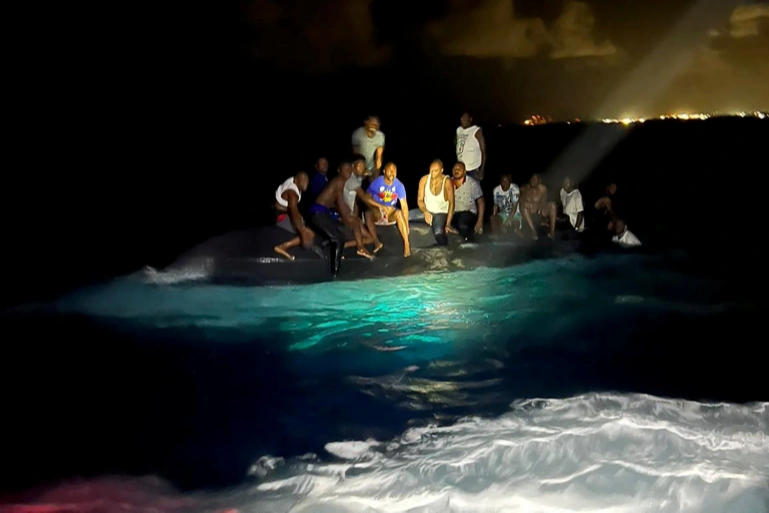
Survivors of a boat that capsized perch on the overturned vessel off the coast of New Providence island in the Bahamas [Royal Bahamas Defence Force/Handout via Reuters]
Nassau, July 24 (RHC)-- Seventeen people have died after a boat carrying dozens of Haitian refugees capsized off the coast of the Bahamas, authorities said, as more Haitians attempt to reach the United States to flee gang violence and poverty at home.
Rescue teams recovered the bodies of 17 people, including an infant, and 25 people were rescued, four of them women, Bahamian Prime Minister Philip Davis told a news conference on Sunday. Davis said authorities believe they were on a speedboat heading for Miami. “It is believed that the vessel capsized in rough seas,” he said.
Up to 60 people may have been on board and more people were presumed missing, said Police Commissioner Clayton Fernander. Bahamian authorities said that two people were taken into custody, both from the Bahamas, over the suspected human smuggling operation.
All those on board recovered alive or dead or who were still missing were believed to be migrants from Haiti. The Bahamas police said the boat capsized approximately 11 km (6.8 miles) off the island of New Providence.
The Bahamas is a transit route for Haitian immigrants seeking to reach the U.S. mainland, and since last year, the frequency of these irregular voyages using dilapidated ships has increased, in light of the worsening economic and security conditions in Haiti.
Haiti has been reeling from a host of other crises. In 2010, it was rocked by a magnitude 7.2 earthquake that killed an estimated 360,000 people. The powerful earthquake devastated much of the country, which shares the island of Hispaniola with the Dominican Republic. Amid persistent insecurity and political instability, Haiti has struggled to rebuild.
A growing number of Haitians have been fleeing the country in search of safety and work. Many have headed towards the U.S. and countries in Latin America. Most Haitians try to cross into the U.S. by land through the U.S.-Mexico border, but others have been taking to the sea.
The U.S. Coast Guard said it has intercepted and returned more than 6,100 Haitians at sea since October, the largest attempted migration of Haitian boat refugees in 20 years.
Bahamas Immigration Minister Keith Bell said survivors indicated that they paid between $3,000 and $8,000 for the voyage. “We mourn the lives lost of those seeking a better way of life,” Bell said. “Those here with families and friends in Haiti, encourage your loved ones not to risk their lives.”
In May, a boat carrying 842 Haitians bound for the U.S. strayed off course and washed ashore along the north coast of Cuba instead. That same month, 11 people drowned when a vessel carrying Haitians capsized near Puerto Rico.
The U.S. continues to expel the majority of refugees – including Haitians – under a coronavirus pandemic rule that allows border officials to quickly turn back migrants to their country of origin, or to Mexico, without processing their asylum claims.
In September last year, some 15,000 Haitian refugees gathered in south Texas hoping to claim asylum. But US authorities cleared out the makeshift camp and sent the vast majority back to Haiti on board deportation flights.

